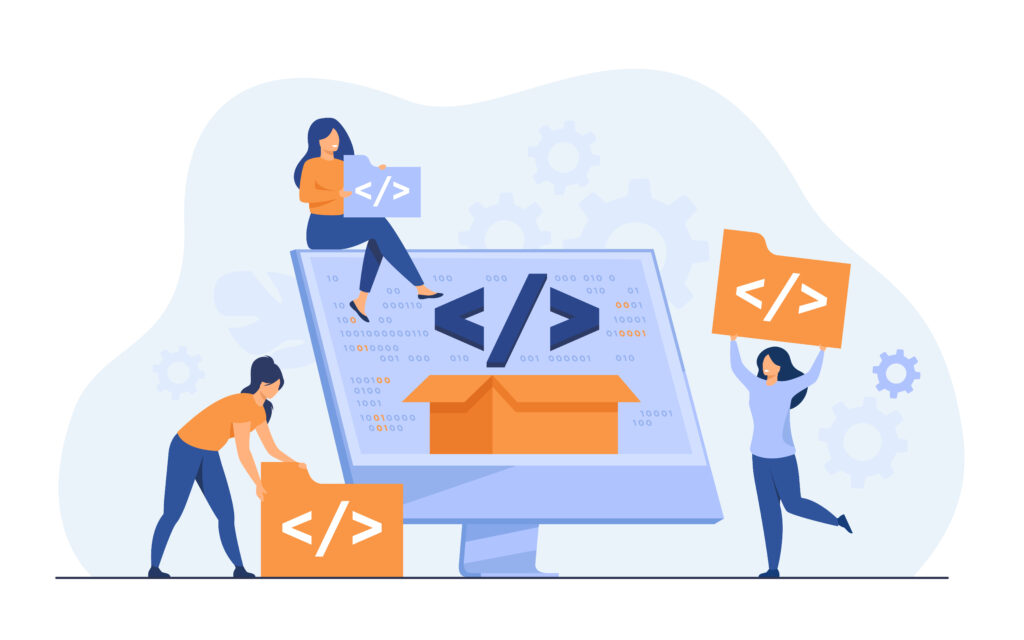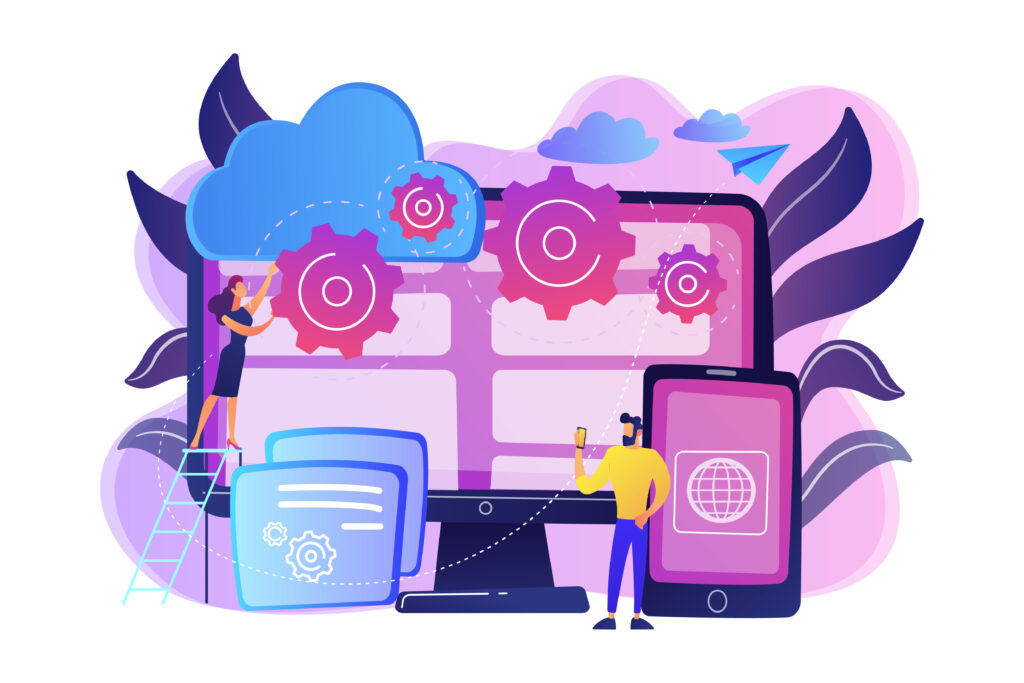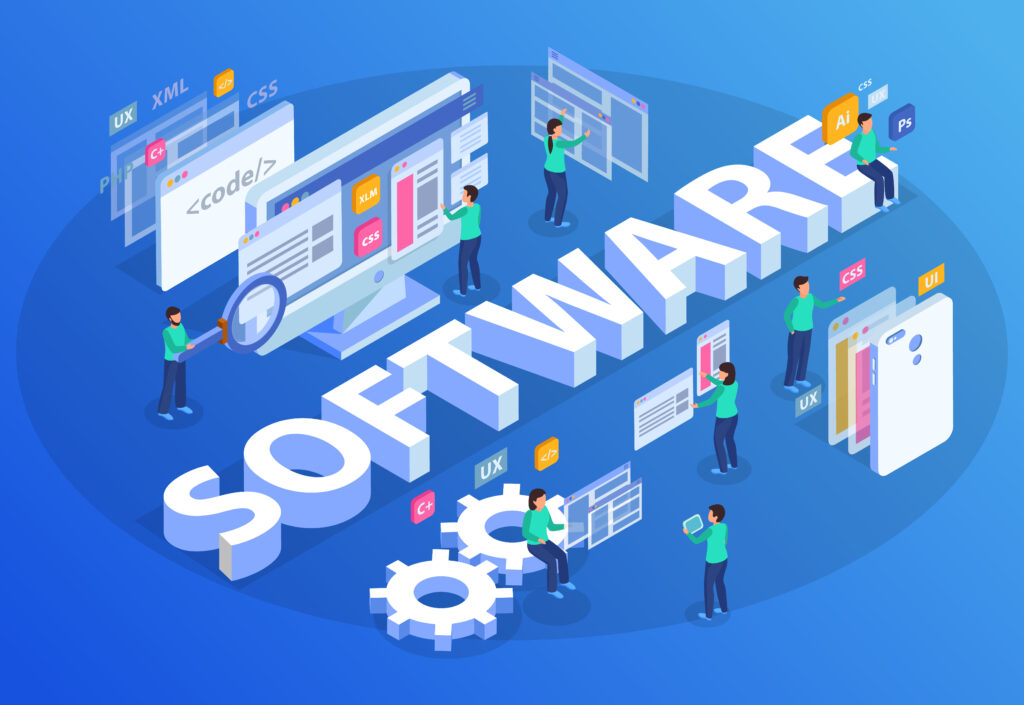What Is Custom Business Application Development?
Custom business application development refers to the creation of software solutions tailored to the unique operations, business model, and future growth objectives of a company. These applications cater to the specific internal processes, workflows, and customer interactions of an organization. This enables businesses to fulfill their exact requirements rather than conforming to the limitations of off-the-shelf software.

Key Features of Custom Business Applications:
- Tailored Features: Specifically designed to align with the unique processes of the business.
- Custom Integrations: Effortlessly connects with existing systems and databases.
- Scalability: Developed to expand alongside the business over time.
- Flexibility: Capable of adaptation and modification in response to changing business needs.
Key Steps in Custom Business Application Development

Requirement Gathering and Analysis
Objective: The development process starts with a comprehensive assessment of the business’s specific requirements. This involves examining current workflows, pinpointing pain points, and outlining the necessary features and functionality to address those issues.
Activities: Conduct stakeholder interviews, analyze workflows, benchmark competitors, and perform market research.
Design & Prototyping
Objective: Once the requirements are well-defined, the next step involves designing the application architecture and user interfaces. Prototyping enables stakeholders to visualize the app’s layout, features, and functionality.
Activities: Developing wireframes, design mockups, and interaction models to illustrate how the app will operate.
Development
Objective: Developers commence coding the application based on the finalized design and specifications. This phase includes constructing the backend (database, server-side logic) and frontend (user interface, user experience).
Activities: Writing code, creating databases, implementing business logic, and integrating third-party services as necessary.
Testing and Quality Assurance
Objective: This phase ensures that the application functions as intended, is free of bugs, and meets the business’s performance, security, and usability standards.
Activities: Conducting functional testing, performance testing, security testing, and user acceptance testing (UAT).
Deployment
Objective: After successful testing and approval, the application is deployed in the live environment. This includes setting up the production infrastructure, configuring servers, and ensuring the app is accessible to end users.
Activities: Final configuration, server setup, and launching the application in the production environment.
Maintenance & Support
Objective: Post-deployment, continuous support and maintenance are provided to ensure the application operates smoothly, is updated as required, and remains secure.
Activities: Addressing bug fixes, monitoring performance, implementing regular updates, and adding new features.
Benefits of Custom Business Application Development

1: Tailored to Business-Specific Needs
Custom applications are designed to meet the specific processes and requirements of a business. This approach removes the constraints associated with off-the-shelf solutions, ensuring that every feature and function of the application serves a distinct purpose for the organization.
- Optimized Workflows: Custom applications enhance business operations, leading to improved efficiency and productivity.
- Unique Features: Custom development allows businesses to incorporate features that are not typically available in generic software, tailored precisely to the organization’s needs.
2: Improved Integration with Existing Systems
Many businesses utilize various tools, including CRMs and ERPs, to manage their operations. Custom business applications can be designed to integrate effortlessly with these existing systems, reducing the need for manual data entry and minimizing errors.
- Seamless Data Flow: A custom application can extract data from multiple internal systems, facilitating automated workflows and enhanced decision-making.
- Custom APIs: Businesses can develop APIs that connect their custom applications with third-party tools, thereby extending the app’s functionality.
3: Scalability
As a business expands, its operational requirements also grow. Custom business applications are designed with scalability in mind, enabling them to adapt and evolve alongside the company without requiring complete overhauls.
- Future-Proofing: The architecture of the application can be developed to accommodate increased user loads, additional features, and more complex data management as the business grows.
- Modular Development: Custom applications can be structured so that new modules or functionalities can be easily integrated over time, ensuring the app remains aligned with evolving business needs.
4: Enhanced Security
Security is a significant concern for businesses, particularly those that handle sensitive data. Custom applications can be designed with the highest security standards, ensuring that the business’s data is safeguarded against external threats.
- Data Encryption: Custom applications can incorporate advanced security features such as data encryption, secure user authentication, and access control.
- Compliance: Developers can create custom business applications to meet industry regulations such as HIPAA, GDPR, or PCI-DSS. This will ensure the management of sensitive data in accordance with legal requirements.
5: Cost Efficiency Over Time
While the initial investment in custom development may be higher than that of off-the-shelf solutions, custom business applications can lead to significant cost savings over time. This is due to businesses avoiding recurring licensing fees, only paying for the features they require, and having greater control over upgrades and maintenance.
- No Licensing Fees: Businesses own Custom applications, eliminating the necessity for ongoing payments to third-party providers.
- Focused Investments: Businesses can allocate resources for updates, upgrades, and new features as needed. This will result in more predictable and manageable costs.
6: Competitive Advantage
Custom business applications provide businesses with unique tools that can give them a competitive edge over those using off-the-shelf software. A well-designed application can enhance operational efficiency, boost customer satisfaction, and foster innovative solutions to business challenges.
- Innovative Features: Custom applications enable businesses to implement features or services that competitors may not offer, creating differentiation in the marketplace.
- Improved Customer Experience: By delivering a solution specifically tailored to their needs, businesses can provide a superior user experience, enhancing customer loyalty and satisfaction.
7. Better User Experience (UX)
A custom business application can focus on the specific end-user’s needs during its design. This will ensure that the app is intuitive and user-friendly for both employees and customers. Off-the-shelf software may not adequately address the unique requirements of your workforce or customer base.
-
- Simplified Workflows: By tailoring the application to specific business processes, users can complete tasks more quickly and with fewer errors.
8. Real-Time Reporting and Analytics
Custom business applications can incorporate sophisticated reporting and analytics tools. This enables businesses to monitor their performance, track key metrics, and make informed, data-driven decisions.
- Custom Dashboards: Organizations can develop tailored reporting dashboards that display KPIs pertinent to their operations. This ensures that essential information is readily available.
- Real-Time Data: By accessing real-time data, decision-makers can swiftly respond to shifting market conditions or internal inefficiencies, facilitating agile and informed business strategies.
Challenges of Custom Business Application Development

While custom business application development offers numerous advantages, there are also challenges to consider:
Higher Initial Costs
Custom development usually necessitates a higher upfront investment compared to off-the-shelf solutions, owing to the specialized design, coding, and integration efforts required. However, businesses often offset these initial costs with long-term savings in licensing fees and the enhanced efficiency a more tailored solution provides.
Development Time
Creating a custom business application from the ground up can take significantly longer than implementing an off-the-shelf solution. The timeline for development can vary based on the app’s complexity and the specific requirements of the business.
Ongoing Maintenance
After launching the application, businesses must ensure continuous maintenance and support. This encompasses fixing bugs, updating security features, and guaranteeing compatibility with new technologies.
Skill Requirements
Developing and maintaining custom applications requires specialized skills that may not be readily available within the existing workforce. Businesses may need to invest in training or hire external talent, which can further increase costs and complicate the development process.
By understanding these challenges, businesses can better prepare for the custom development journey and maximize the benefits while mitigating potential downsides.
[Want to learn more about custom business application development? Click here to reach us.]
Conclusion
Custom business application development presents a powerful opportunity for organizations to create tailored solutions that meet their specific needs and drive operational efficiency. By addressing unique workflows, improving integration with existing systems, and offering scalability, custom applications empower businesses to stay competitive in an ever-evolving market.
While the journey of custom development may involve higher initial costs, extended development timelines, ongoing maintenance, and skill requirements, the long-term benefits—such as enhanced user experience, real-time analytics, and cost efficiency—far outweigh these challenges.
Investing in a custom business application is not just about creating software; it’s about fostering innovation, improving processes, and positioning the organization for future growth. As businesses continue to navigate the complexities of modern operations, custom applications will remain a critical component of their strategic toolkit, enabling them to adapt, thrive, and succeed in a dynamic landscape.
To support businesses in this endeavor, Bobcares offers comprehensive software development support services. With a focus on understanding each client’s unique needs, Bobcares provides expert guidance throughout the development process, ensuring that custom solutions are efficiently designed, implemented, and maintained. By partnering with Bobcares, organizations can leverage their expertise to maximize the benefits of custom business applications, enhancing overall performance and driving success.







0 Comments